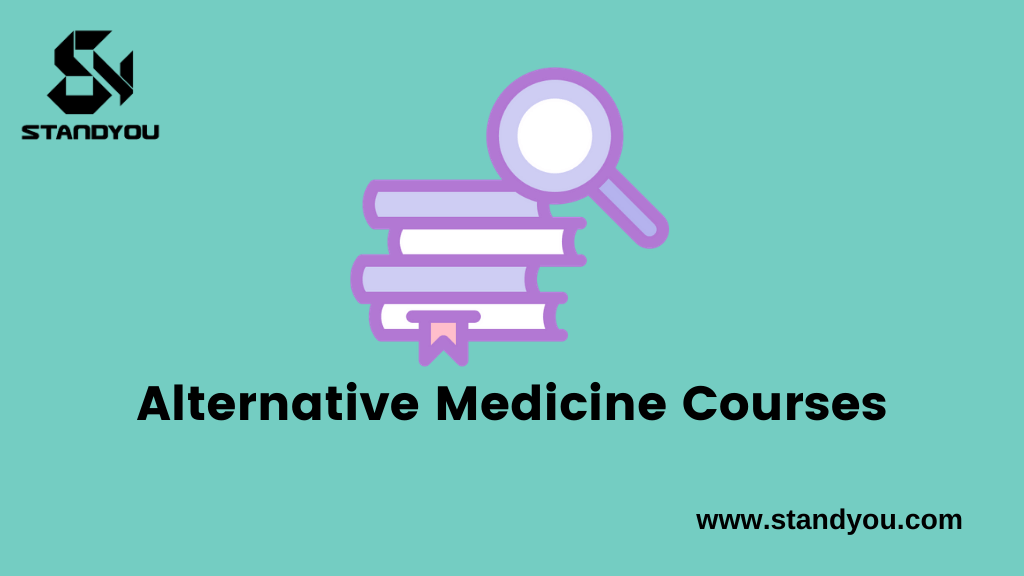Check out the complete details about Alternative Medicine courses....

Aug 20, 2020 02:24:20

“The art of healing comes from nature itself”. Alternative Medicine courses or system is the study of common clinical practices that utilizes old procedures to mend the body. It centers around clinical items and practices that are outside the regular clinical consideration. There are a variety of traditional health practices that exist in the world. Various customary frameworks of medication exist in India among which Ayurveda and Siddha had completely begun and created in India. The effectiveness and scientific relevance of these systems of medicine make them a popular stream of study among young aspirants in India.
AYUSH is an abbreviation for Ayurveda, Yoga and Naturopathy, Unani, Siddha, and Homeopathy and are the six Indian systems of medication predominant and rehearsed in India and a portion of the neighboring Asian nations. There are a number of alternative medicine colleges in India offering the course at diploma, undergraduate and postgraduate levels.
Courses such as BAMS (Bachelor of Ayurvedic Medicine and Surgery), BHSM (Bachelor of Homeopathic Medicine and Surgery), BUMS (Bachelor of Unani Medicine and Surgery) and BNYS (Bachelor of Naturopathy and yoga science) come under Undergraduate degrees whereas MD (MD in homeopathy, MD Ayurveda, etc), Master’s degree program (Master of Naturopathy and Masters of yoga science and PG diploma certification (PG diploma in Alternative Medicine) degrees are available for postgraduation.
Alternative Medicine course requests its competitors to have sound information about the essential structure and the working of the human body. They ought to have the option to discover the issue and it is beginning precisely in order to propose treatment modalities. They ought to have persistence in regarding the customers as the ailment and health result takes longer than allopathic medication. They ought to have elevated levels of compassion to comprehend the mental injury of the customers.
The term “Ayurveda” or “Ayurvedic Knowledge” originated in India 5000 years ago and is often known as the mother of all healing. The term “Ayurveda” means “Knowledge or Science of life”. It was derived from the Sanskrit words “Ayu” meaning life and “Veda” meaning knowledge. Rigveda depicts the utilization of plants as medication in India and Atharvaveda which portrayed more plants and presented furthermore essential ideas of Ayurveda.
The principles of many of the natural healing systems now familiar in the West have their roots in Ayurveda, including Homeopathy and Polarity Therapy.
In Ayurveda, treatment includes two unique kinds of specialists – Practitioners and containers. Among the classification of experts, there is a subcategory for Ayurveda specialists, which is of two kinds, the individuals who rehearse as panchakarma advisors and the individuals who practice as Ayurveda dieticians. Panchakarma is a therapeutic way of disposing or elimination of harmful components from the body.
Ayurveda is based on the principle that the entire universe and the human body are one and that the same principles govern both. The universe, according to Ayurveda is composed of 5 basic elements - space/ether (Akash); air/wind (Vayu); fire (Tejas); water (Jal); earth (Prithvi).
Ayurvedic sages condensed these five principles into constitutional types – doshas, which are called: Vata (a combination of the elements of space and air); pitta (a combination of fire and water), and Kapha (a combination of water and earth). These principles govern our entire physiology. Ayurveda also focuses on diet, hygiene, exercise, yoga, and meditation.
BAMS is an undergraduate degree program that is designed to make students familiar with the concepts of Ayurveda and use it for the treatment of patients. BAMS incorporates Ayurveda with the concepts of modern medicines and students are taught a combination of both as part of the course curriculum.
BAMS is a 5 year and 6-month long bachelor degree course. The course duration includes 4.5 years of academic sessions and 1 year of internship.
The word ‘Yoga” is derived from a Sanskrit word “Yuj” meaning to join together the mind, body, and spirit. The aims include that of bringing a balance into the body physically, mentally, emotionally, and spiritually. Yoga is considered as an antidote to stress and a potentially powerful tool for living a healthy and balanced life.
Yoga describes different Asanas or postures and breathing exercises for better health and as a remedy for some diseases. Even though yoga isn't an alternative to drugs, it can be utilized as an extra treatment and could diminish the prerequisite of medications in a few conditions. According to Naturopathy, an individual is healthy when he/she is in perfect harmony with nature. In a diseased condition, naturopathy promotes the self-healing power of the human body. Naturopathy considers nature as the greatest healer. It considers the body as a whole. Its fundamental belief is using the 5 primordial agents of nature that is the earth water fire and the air along with ether. Some say Naturopathy and Ayurveda have the same roots. But Naturopathy is an eclectic and holistic alternative medical system that concentrates more on natural medications and the body's vital ability to cure and uphold itself. However, Ayurveda is a branch of medicine that integrates the body, psyche, and spirit to prevent and cure various types of ailments. Bachelor of Naturopathy and Yogic Sciences (BNYS) will focus on working closely with patient’s symptoms as well as reactions to ensure that the treatment provider is in most cases personalized. BNYS is a four and half year program which has to be followed by a one-year internship.
The word Unani or Yunani has originated from the greek. In Hindi, Urdu, and Persian the word means “Greek Medicine” and is a form of traditional medicine widely practices in South Asia. It is also primarily practiced in India. Including the utilization of homegrown cures, dietary practices, and elective treatments, Unani medication tends to the counteraction and treatment of infection.
According to practitioners of Unani medicine, it is based on the concept of four senses of humor: Phlegm, Blood, Yellow Bile, and Black bile. Another key rule of Unani medication is that illness results from an imbalance in air, earth, water, and fire, four components thought to involve such exist in nature, including the human body.
Also, Unani medication is somewhat founded on the rule that ecological conditions, including the nature of water and air,) can essentially affect wellbeing. Unani practitioners can practice as qualified doctors in India. Unani medication is extremely near Ayurveda. Both depend on the nearness of 4 components in the human body (Earth, Fire, Water, and Air). As indicated by Unani medication, These components are available in various liquids and their unevenness prompts ailment or illness. B.U.M.S. is an undergraduate medical degree in the field of Unani medicine and surgery. Bachelors of Unani Medicine and Surgery (BUMS) is a five and a half years undergraduate degree, of which 4.5 years will be the academic session and one year of compulsory rotatory internship.
Siddha Medicine is believed to be more than 10,000 years old. This system of medicine also known as the Traditional Tamil System of Medicine originated in the Tamil speaking regions. Generally, “Siddha Medicine” means perfect medicine. Siddha medicine is also almost similar to Ayurveda. As per Siddha Medicine, different mental and physiological elements of the body are identified with the blend of seven components; Plasma, Blood, Muscle, Fatty tissue, Bone, Brain, and Semen. In the Siddha system, diet and way of life assume a significant job, in wellbeing as well as in restoring maladies or diseases. Various online courses are available under the Siddha system of Medicine.
Homeopathy is an elective clinical practice in which very weaken measures of certain common substances are utilized to treat different infirmities. Homeopathy has an extraordinary way of thinking and therapeutics.
Homeopathy was developed in the late 18th century by Samuel Hahnemann, a respected doctor in Germany. A homeopath will recommend medications as per the patient's particular arrangement of side effects, and how they experience them, considering their overall level of health. Homeopathy depends on the guideline of "like deals with like" – that is, a substance which can cause manifestations when taken in huge dosages, can be utilized in modest quantities to treat comparative side effects.
Bachelor of Homeopathic Medicine and Surgery or BHMS is a graduate degree program in homeopathy that covers the knowledge of homeopathic medicine. Upon completion of this degree, students are eligible to become doctors in the homeopathic medical domain. These days, homeopathic medication study is being favored by numerous students needing to seek after a vocation in drugs, when compared with other clinical courses.
The span of the course is 5.5 years which incorporates 4.5 long periods of study followed by 1 year of temporary job or internship. Every understudy must experience a mandatory pivoting temporary position of one year, after passing the final BHMS examination.
These specialists of Alternative medication are popular in Government AYUSH focuses and in elective medication wing of PHCs. They are likewise selected by the administration and private facilities, private organizations, Patanjali, recovery focuses, Pharmaceutical businesses, for example, Hamdard, life science ventures, and so forth. The majority of these alumni adjust to free practice and start their facilities and focuses.
© 2024 Standyou Data Info Labs Private Limited.